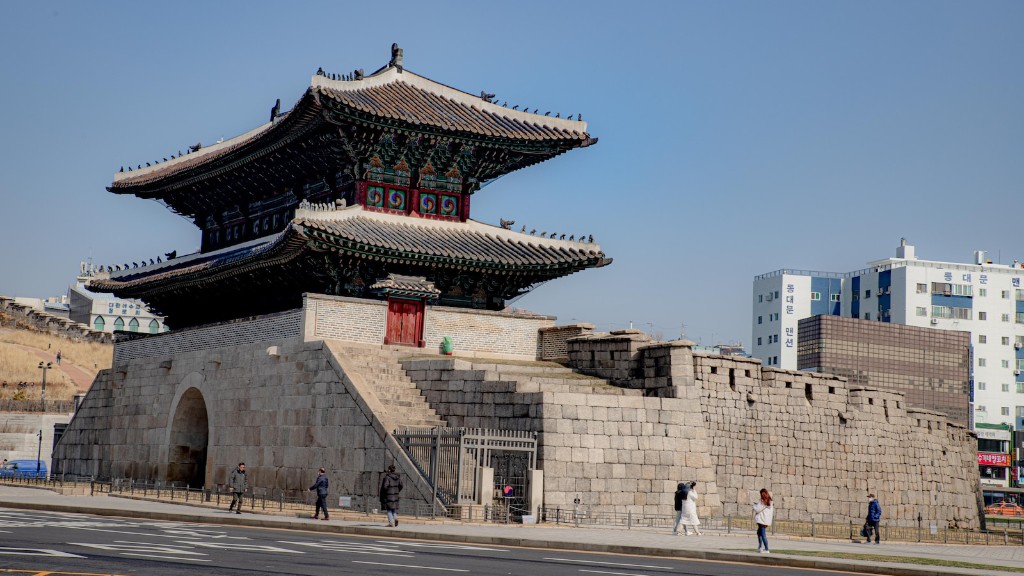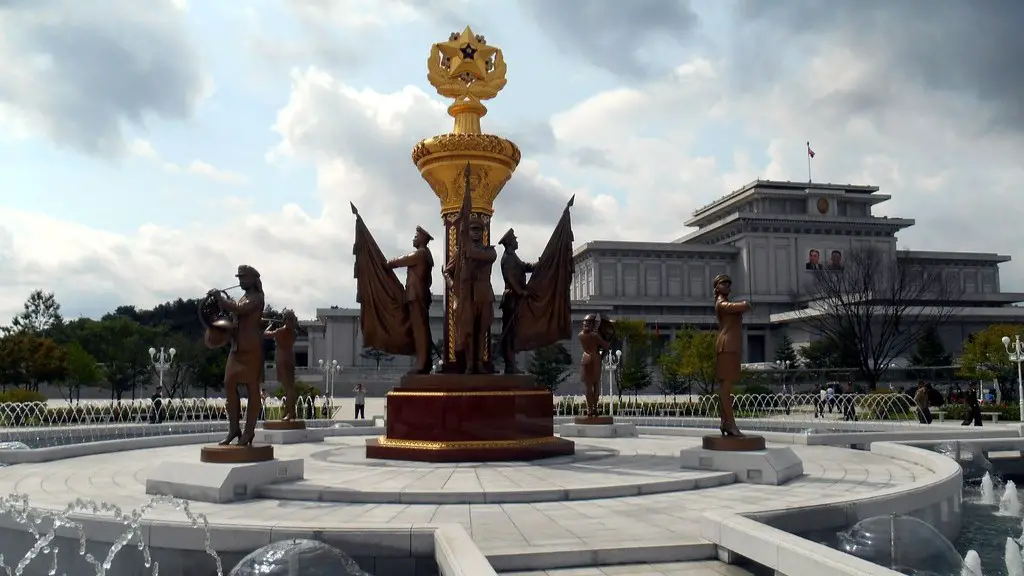When North Korea invaded South Korea on June 25, 1950, it was a surprise to much of the world. While North and South Korea had been in a state of Cold War hostility since the end of World War II, the invasion was a dramatic escalation of the conflict and it marked the beginning of the Korean War. North Korea’s attack on South Korea occurred in the context of the Cold War and international relations between the United States and China, which was the main backer of North Korea. Analyzing why North Korea attacked South Korea requires a look at the underlying causes of the escalation in tensions.
In the period after World War II, the Korean Peninsula was divided along the 38th parallel. This resulted in the creation of two separate governments in South Korea, which was supported by the United States and its allies, and North Korea, which was backed by the Soviet Union and China. As tensions between the United States and the Soviet Union increased as a result of the Cold War, the tensions between North and South Korea also increased. This included armed clashes and guerrilla warfare along the demilitarized zone.
One of the key factors in the North Korean decision to invade the South was the internal political situation in North Korea. North Korea’s leader, Kim Il-sung, was facing increasing internal opposition to his regime and wanted to prove his power and legitimacy by defeating the South. In addition, North Koreans had a strong sense of national identity and felt they had a right to the entire Korean Peninsula. They viewed the South as a puppet of the United States and saw the invasion as an opportunity to reunite the Korean people under their rule.
Another factor in the North Korean decision to invade the South was the international situation. The Chinese and Soviets had both encouraged North Korea to seize control of all of the Korean Peninsula and believed that it would be a major blow to the United States. The Chinese also wanted to prevent the establishment of a capitalist state on their border, which they feared could be used as a base of U.S. operations and influence in Asia. Finally, North Korea wanted to reunite the peninsula under their control and create a powerful, united Korea that would, they hoped, be able to stand up to U.S. dominance in Asia.
Given these factors, it is clear that North Korea’s invasion of the South was motivated by a combination of internal and external pressures. Kim Il-sung saw the invasion as a means of strengthening his position at home and establishing a powerful unified Korea in the region. The Chinese and Soviets saw the invasion as a way to weaken U.S. influence in the region and expand their own power. Ultimately, the invasion resulted in the tragic and tragic Korean War, which lasted for three years and left millions dead or displaced before a ceasefire was declared.
Role of the United Nations in the Korean War
The United Nations played a critical role in the Korean War. When the North Koreans first invaded South Korea in June 1950, the UN Security Council immediately passed a resolution condemning the invasion. The UN resolution called on member states to assist South Korea in repelling the invasion. It also called on member states to provide military assistance to South Korea and authorized the deployment of UN forces to the peninsula. As a result, a force of twenty-one nations, known as the United Nations Command (UNC), was formed to defend South Korea. The UNC forces were predominantly made up of U.S. and South Korean forces, but they also included troops from other nations such as the United Kingdom, Canada, Australia, and France.
The UNC forces managed to push the North Korean forces back to the Chinese border and nearly succeeded in reunifying the Korean Peninsula. However, in October 1950, the Chinese intervened in the conflict and sent hundreds of thousands of troops to support the North Koreans. This forced the UN forces to retreat and ultimately resulted in a stalemate that lasted until the 1953 armistice was signed.
The role of the United Nations in the Korean War was critical. The UN resolution condemning the North Korean invasion provided a legal basis for the participation of UN forces in the conflict and helped to legitimize the UN’s role in international affairs. It also helped to rally support from around the world for South Korea and demonstrate that the international community was united in opposition to North Korea’s aggression.
Legacy of the Korean War
The Korean War was an incredibly destructive conflict. Hundreds of thousands of people were killed and millions more were displaced as a result of the fighting. In the decades since the war, the Korean Peninsula has been divided between the North and South, with a heavily guarded demilitarized zone separating them. The legacy of the war is still felt today in the ongoing tensions between North and South Korea and the continuing presence of U.S. forces in South Korea.
The war also had a significant impact on the way international law is viewed. The UN Security Council resolution condemning the invasion of South Korea and authorizing the deployment of UN forces demonstrated the importance of international organizations and international law in resolving conflicts. It also highlighted the importance of having a strong collective security system in place for dealing with threats to global peace and stability.
The Korean War also had a major impact on U.S. foreign policy. The United States had a large military presence in Asia before the war and maintained it after the armistice was signed. This presence helped to contain the spread of communism in the region and maintain a balance of power. It also led to increased U.S. involvement in global affairs in the decades that followed.
Domestic Impact of the War in North and South Korea
The effects of the war were felt deeply by both North and South Korea. In the North, the war resulted in the consolidation of power of Kim Il-sung and his regime and a rapid militarization of the country. In the South, it resulted in the restoration of democratic rule and rapid economic growth, but also led to increased tensions with the North. And both countries continue to be scarred by the violence and destruction of the war.
The destruction caused by the war was immense. South Korea suffered significant destruction of its infrastructure and economy, while the North was devastated by the massive U.S. bombing campaign. Both countries have also suffered from the physical and psychological wounds of war, as millions of Koreans who survived the conflict have suffered trauma. And both countries are still divided, with the number of refugees that were displaced during the war estimated to be in the millions.
The legacy of the war is still felt in both Koreas today. In the North, the regime of Kim Il-sung and his successors has used the war to maintain an atmosphere of fear and nationalism. In the South, there is an ongoing effort to reunify the Korean Peninsula and improve relations between the two countries. Both Koreas continue to be affected by the tragedy and destruction of the war, and it is clear that it will be a long time before the two countries are able to heal their wounds.
Modern US-Korea Relations
Since the end of the Korean War, the United States and South Korea have developed a close alliance. This was largely driven by the U.S. policy of containing communism in the region and ensuring the security of South Korea. This has resulted in a close cooperation between the two countries, with the United States providing South Korea with military and economic assistance. In recent years, the alliance between the two countries has also been strengthened by U.S. support for South Korea’s pursuit of reunification of the peninsula.
The United States and South Korea also have a strong economic relationship. The United States is South Korea’s largest trading partner, and the two countries engage in a large bilateral trade of goods and services. The United States is also one of the largest investors in South Korea and has played a key role in the country’s economic development. As a result, the two countries have a close economic relationship.
In addition to economic ties, the United States and South Korea also share a strong security relationship. The United States maintains a large military presence in South Korea and plays an active role in the country’s defense. This includes carrying out joint military exercises and providing military assistance when needed. The United States and South Korea also cooperate on a number of security-related issues, including counter-terrorism and cybersecurity.
Conclusion of the Korean War
The Korean War was a devastating conflict, and its effects are still felt today in both North and South Korea. This includes the deeply divided peninsula, the presence of U.S. forces in the region, and the psychological and physical effects of war. The war also had a significant impact on international relations, demonstrating the importance of international law and the need for a strong collective security system. Finally, the war also resulted in a close alliance between the United States and South Korea, with the two countries deepening their economic and security ties.




